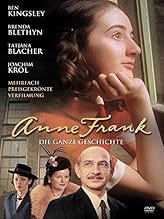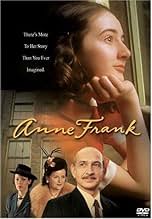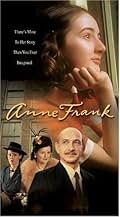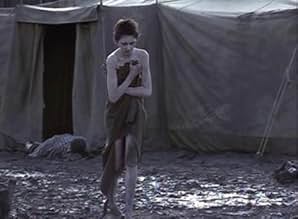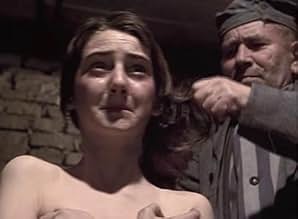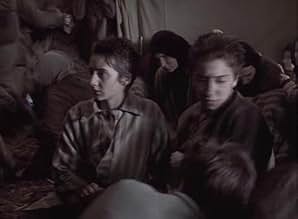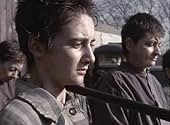Ajouter une intrigue dans votre langueThe life of Anne Frank and her family from 1939 to 1945: pre-war fears, invasion of Netherlands by German troops, hiding in Amsterdam, deportation to the camps, return of Anne's father.The life of Anne Frank and her family from 1939 to 1945: pre-war fears, invasion of Netherlands by German troops, hiding in Amsterdam, deportation to the camps, return of Anne's father.The life of Anne Frank and her family from 1939 to 1945: pre-war fears, invasion of Netherlands by German troops, hiding in Amsterdam, deportation to the camps, return of Anne's father.
- A remporté 2 prix Primetime Emmy
- 15 victoires et 32 nominations au total
Histoire
Le saviez-vous
- AnecdotesSteven Spielberg was to be the executive producer, but declined after receiving a letter from Anne Frank's relatives asking him not be involved with the project because it was not based on the authorized account of Frank's life.
- GaffesIn the movie, the address given to the Germans of the hiding place over the telephone by the supposed informer is incorrect. The informer says the address is 263 Lindtstradt, but was actually 263 Prinsengracht. It still exists today as the Anne Frank House museum in Amsterdam. The real betrayer of the hiding place has never been revealed or proven beyond only circumstantial evidence. The informer depicted in the movie is based on the belief of Melissa Muller, who wrote the book (Anne Frank: A Biography) that the movie is largely based on. In her book "The Hidden Life of Otto Frank" by Carol Ann Lee, which was published in 2002 and revised in 2003, an entirely different theory as to the identity of the informer is presented. Officially, the identity of the actual informer that betrayed those in the hiding place has never been conclusively determined and most likely never will be, as most of those that would be able to shed more light on the subject have since died.
- Citations
Margot Frank: Do you remember how - how I was always taking care of you when you were little?
Anne Frank: Well, it's my turn to take care of you now.
Margot Frank: It doesn't matter anymore.
Anne Frank: No! You can't leave me here.
Margot Frank: Tell me a story, Anne. I used to love your stories.
Anne Frank: Pim's stories were always much better than mine. Poor Pim.
Margot Frank: But you're still going to be a writer though, aren't you? And he'd like that. Do you remember how we talked about it? About - about what we were going to do, after the war?
Anne Frank: And what were you going to be?
Margot Frank: I can't - I can't remember.
Anne Frank: Yes, you can. You have to! You wanted to be a nurse. That's what you told me.
Margot Frank: That's right. A nurse. A nurse in - in Palestine.
Anne Frank: Paris or London, that's where I'm going. To see the world.
Margot Frank: To see the world...
- ConnexionsFeatured in The 53rd Annual Primetime Emmy Awards (2001)
For me, the virtual incarceration of her family in the factory was very sad and thought-provoking. Taken from their normal lives and stripped of all those things they held dear, Anne's family strives to remain positive of better times ahead. How would we fare if required to give up all that we possessed and go into hiding for fear of our lives? A totally depressing thought, and yet that is what happened to Anne and her family.
The later scenes, after the family was captured, humiliated, separated and sent to concentration camps, is simply tragic.
The fine performances of Hannah Taylor-Gordon in the title role and Ben Kingsley as her father, Otto Frank, deserve special mention, although the entire cast was believable. Hannah Taylor-Gordon's performance was a revelation - she conveyed a range of emotions that superbly captured Anne's spirit and also her human weaknesses.
The movie is not without its weaknesses. It is slow at times and could perhaps been improved by tighter editing, although this may have detracted from the accurate portrayal of the tediousness of living concealed behind closed doors for so long a period.
The concentration camp scenes are disturbing and Anne's gradual physical deterioration is depressing. It is not a movie to entertain but one to stir the emotions and the resolve to ensure that this sort of persecution and genocide is never again allowed to happen.
It is also a depressing reminder that it still is happening in various parts of the world.
- -628
- 14 janv. 2004
- Lien permanent
Meilleurs choix
- How many seasons does Anne Frank: The Whole Story have?Propulsé par Alexa
Détails
- Durée1 heure 35 minutes
- Couleur
- Mixage
- Rapport de forme
- 1.33 : 1
Contribuer à cette page



